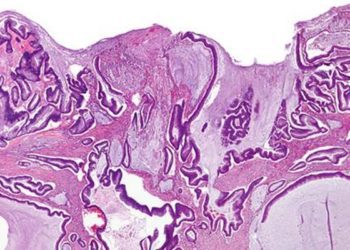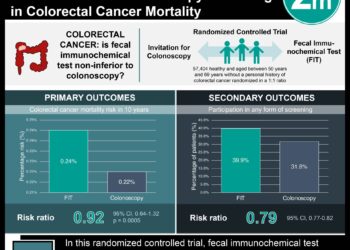Feeding tube improves outcomes after rectal resection
Image: PD
1. Early enteral nutrition (EEN) resulted in shorter time to first defecation after rectal resection for cancer and did not have a higher rate of complications.
2. EEN supplementation was associated with lower rates of anastomotic leakage and early postoperative ileus.
Evidence Rating Level: 1 (Excellent)
Study Rundown: Early enteral nutrition through a nasojejunal tube inserted postoperatively was associated with earlier defecation and lower rates of postoperative ileus. There was also a significantly lower number of anastomotic leaks in the EEN arm. This study suggests that patients who are at a high risk of postoperative ileus should be considered for early enteral feeding. This was well-designed randomized control trial. However, there were a large number of protocol deviations in the group of patients receiving EEN (34 patients) compared to parenteral nutrition (17 patients) resulting from study withdrawal or late start to tube feeding. Additionally, although oral intake was similar between the two groups, patients in the enteral group ultimately received less calories than patients in the parenteral group.
Click to read the study in Annals of Surgery
Relevant Reading: Early Enteral Nutrition Within 24 h of Intestinal Surgery Versus Later Commencement of Feeding: A Systematic Review and Meta-analysis
In-Depth [randomized controlled study]: This study included 123 patients who underwent resection of primary or recurrent rectal carcinoma. The patients were randomized to receive either early postoperative enteral nutrition through a nasojejunal tube (EEN) or early parenteral nutrition (EPN) through a central venous catheter. The EEN was started 8 hours after the end of the surgery and gradually increased over the course a few days for five total days of enteral nutrition. The outcome of interest was postoperative ileus and the primary endpoint for the power analysis was time to first defecation. The enteral nutrition group had a shorter time to first defecation during the first five days as compared to the parenteral group (p = 0.04). Only ten enteral nutrition recipients suffered from early ileus compared to 22 parenteral nutrition recipients (p = 0.02). However, the difference between overall ileus rates was not statistically significant. In terms of complications, EEN resulted in a significant decrease in rate anastomotic leak (p < 0.009). The number of reoperations, days in the ICU, hospital length of stay and readmission rates were not statistically significant between the two groups.
More from this author: Symptomatic relief possible with surgery for metastatic bowel obstruction, Preperitoneal mesh placement a valid option for ventral hernia repair, Surgeons may be unaware of own level of burnout, Home Calculator may predict likelihood of home discharge after surgery, Apgar score for surgery predicts mortality in veterans
©2012-2014 2minutemedicine.com. All rights reserved. No works may be reproduced without expressed written consent from 2minutemedicine.com. Disclaimer: We present factual information directly from peer reviewed medical journals. No post should be construed as medical advice and is not intended as such by the authors, editors, staff or by 2minutemedicine.com. PLEASE SEE A HEALTHCARE PROVIDER IN YOUR AREA IF YOU SEEK MEDICAL ADVICE OF ANY SORT.






